With the exception of two key, patience-testing, dialogue-heavy scenes, Quentin Tarantino’s purposefully misspelled “Inglourious Basterds” is a near-perfect movie and one of the most innovative and unique World War II films ever made.
Rewind, Review, and Re-Rate: ‘Inglourious Basterds’: Director Quentin Tarantino’s Tour-de-Force WWII Re-imagining
|Updated:





